Article 87: Avicenna Bukhara – Coffee boosts energy and mental strength
As soon as it was discovered in Ethiopia, coffee has been accepted as a precious herb to increase vitality, bring excitement and spiritual strength to people.
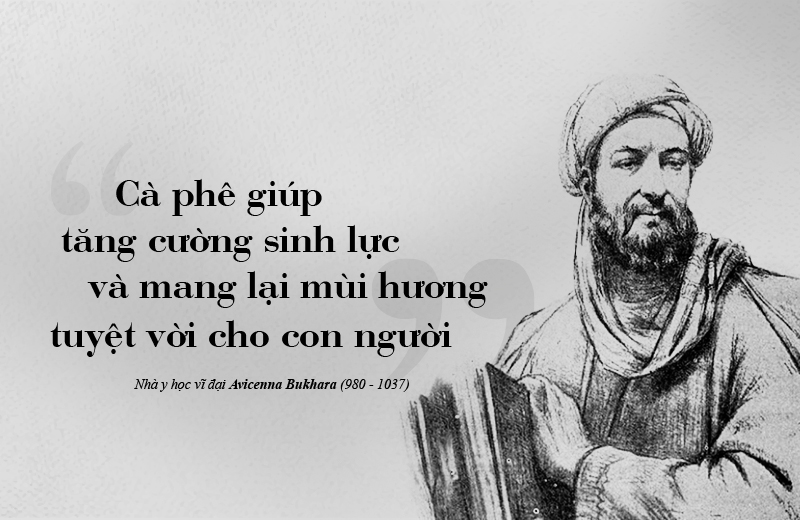
“Coffee helps invigorate and gives the whole body a great aroma.” – The great physician Avicenna Bukhara (980 – 1037)
The elixir in myth and real life
The story of the origin of coffee is now known through legends, and early records survive from the Middle Ages. Although they differ in time and story details, they all acknowledge that the appearance of coffee is associated with the function of being a panacea to help increase the body’s vitality, bring excitement and strength to the spirit.
Attached to the legendary Ethiopian land is the story of the goat herder Kaldi who discovered coffee thanks to the goats after eating berries found in the forest became excited. The poor herder with a heavy heart decided to try this strange fruit and forgot his troubles, becoming the happiest herder in Arabia. Not only that, but Kaldi also told the local monk about his precious discovery. The monk experimented with drying and boiling the fruit that Kaldi found to keep him awake during his prayers and succeeded. The monks believed that the Prophet Mohamed revealed this miraculous fruit to them to dispel fatigue and drowsiness, and to give the body vigor and strength to glorify God. From these religious prayers, the use and miraculous health benefits of coffee spread throughout the Muslim world.
Another story claims that coffee was discovered by Sufi Sheikh al-Shadhili from Morocco. While exploring through Ethiopia, observing that some birds suddenly became energetic after eating some berries, he tasted and experienced a feeling of great vitality.
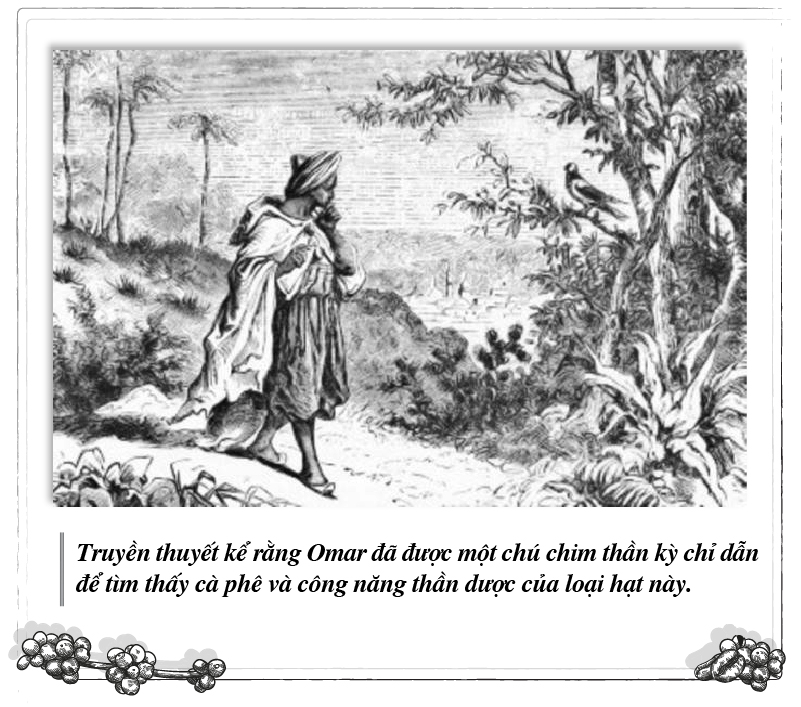
Legend has it that Omar was instructed by a magical bird to find coffee and its medicinal properties.
In an ancient chronicle preserved in the manuscript of Abd-Al-Kadir, the physician Sheik Omar – a healer through meditation and prayer – during his exile to Arabia became exhausted from starvation. He was instructed by a colorful bird to find ripe coffee berries to eat and was miraculously restored to health and vitality. After that, he studied boiling coffee to use to maintain survival energy, as well as using coffee as medicine for many other people. When he was returned to his hometown of Mocha, Omar continued to make coffee to cure his illness.
A real-life story shows that, sometime between AD 575 and 850 – coffee was found and used by the mountain tribes of the Kaffa region of Ethiopia, the ancestors of the Oromo people, to maintain their stamina of walking for days without feeling hungry.
Along with the legends, from the first recorded documents about coffee of the Persian doctors and philosophers Rhazes (850 – 922), Avicenna (980 – 1037) survive to this day, to the documents and studies of later Western historians, philosophers and scientists, such as Leonhard Rauwolf (died 1596), A.Galland (1644–1715), Philippe Sylvestre Dufour (1622 – 1687), Prospero Alpini (1553 – 1617)… all noted that coffee appeared early in the period of classical Arabic medicine, used for healing and medical purposes as a precious herb, good for health, spirit and mind.
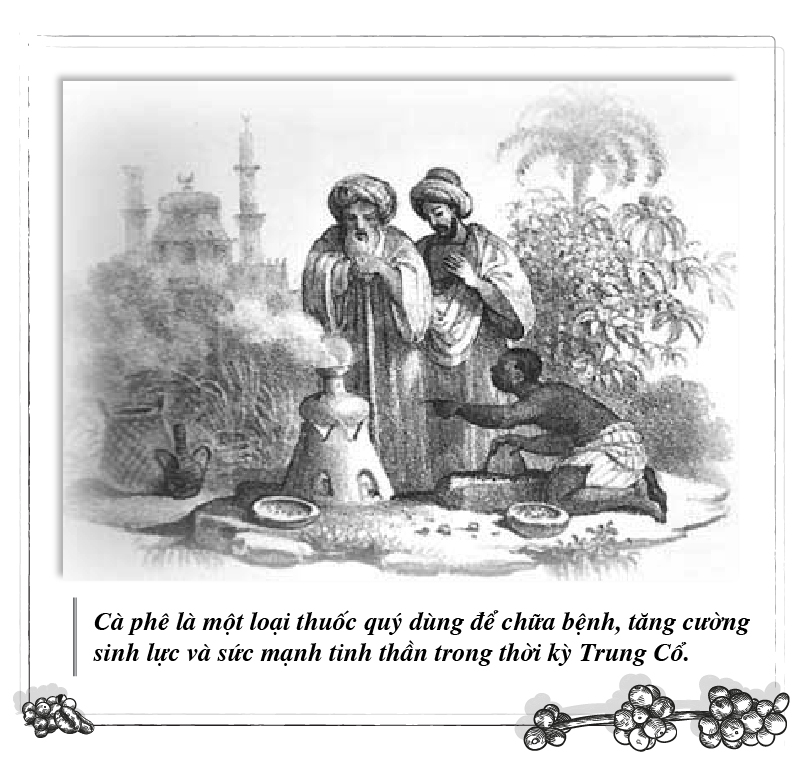
Coffee was a precious medicine used to cure diseases, enhance vitality and spiritual strength in the Middle Ages.
Avicenna Bukhara and the first evidence on the use of coffee in medicine
The practical medicinal uses of coffee were first recognized in the medical text Al-Haiwi (The Continent) of the Persian physician Rhazes (850-922), who is known for his famous medicine works following the great doctors of Islamic medicine, Galen, and Hippocrates. He was the first to mention the properties of coffee beans under the names of bunn and buncham with raw and original information.
It was not until the end of the 10th century that Avicenna Bukhara aka Ibn Sina (980-1037), one of the most prominent doctors, astronomers, thinkers, and writers of the Islamic Golden Age, the “father of modern medicine”, has synthesized and systematically described the characteristics and medicinal uses of coffee for humans as a medicine.
Avicenna’s medical talents were recognized at the age of 17, when he treated the ruler of Bukhara. His reward for that work was permission to use the Royal Library of the Samanids – where he had access to the entire academic field, including medicine. Avicenna developed a medical system that combined his experiences with Islamic medicine, the medical system of Greek physicians such as Galen, Ancient Persia, Mesopotamia and Indian Medicine. Along with Rhazes, Abulcasis, Ibn al-Nafis and al-Ibadi, Avicenna is considered an important figure in early Islamic medicine. He is remembered in the history of Western medicine as a major historical figure who made important contributions to medicine and the European Renaissance.
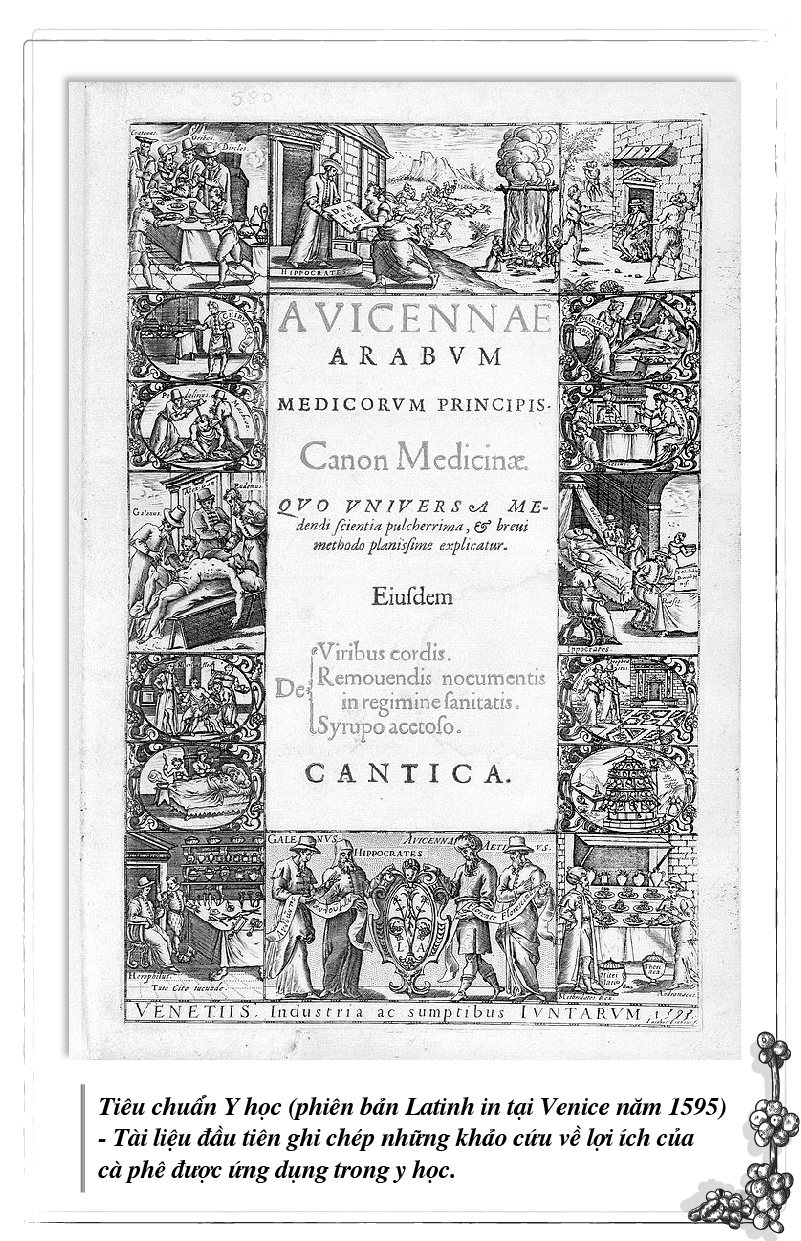
Standard of Medicine (Latin version in Venice in 1595) – the first document to record the research on the benefits of coffee applied in medicine.
Of Avicenna’s 240 extant works, 40 are on medicine. In particular, the book The Canon of Medicines (also known as Al-Qanun fi al-Tibb) was completed in 1025. This is the most famous book in the history of medicine, the encyclopedia of information and standard medical knowledge at many medieval universities in the Middle East and Europe for more than 500 years, providing a solid foundation for early modern medicine.
In The Canon of Medicines, Avicenna describes coffee that comes from Yemen and that coffee beans that are lemon-yellow, light, and fragrant give the best use, while those that are dark are unusable. Synthesized, researched and developed on the documents of Rhazes, Avicenna recognized the medical uses of coffee in a more systematic and clear way. Avicenna’s document states that coffee’s characteristics are hot and dry, while others argue that it is cold. Coffee has the effect of invigorating, cleansing and repairing damaged skin, while bringing a wonderful aroma to the whole body.
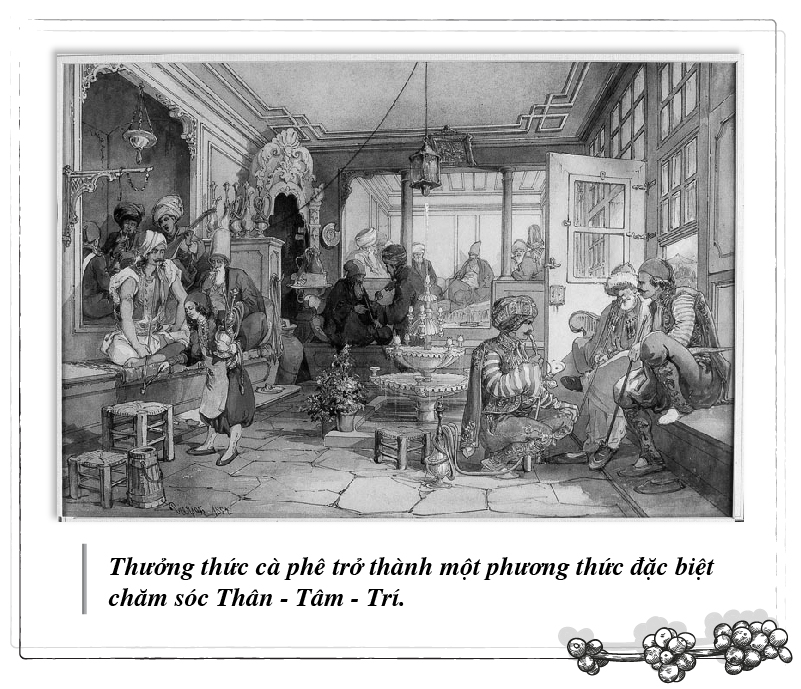
Enjoying coffee becomes a special way to take care of body – spirit – mind
From early research, Avicenna discovered the healing power of coffee and took it far beyond the value of an ordinary drink. This is also the foundation for modern science to delve into and demonstrate the many amazing benefits of coffee for human health and mind. With the support of studies from the Middle Ages to the present, coffee is increasingly being accepted by people and becoming an important part of a healthy lifestyle.
Readers are cordially invited to watch the series of Coffee Tao videos posted on https://bit.ly/caphetrietdao
THE REAL COFFEE
ROASTED ONLY FOR PEOPLE OF WISDOM!
Source: “The Philosophical Way of Coffee” – copyright by Trung Nguyen Legend
Coming up: Coffee in Eastern medical philosophy


